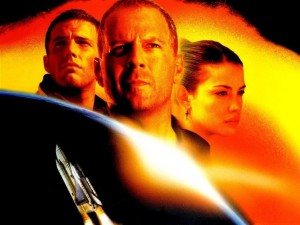“So the world ends Wednesday?”
 That was a colleague’s snarky rejoinder to my explanation of the oil export crisis and the implications for our energy future. Perhaps my explanation was off. Or perhaps we’re all suffering from a Hollywood-induced relevance deficit. Human response systems are really good at spotting and dealing with near-term problems. If it’s not a clear and present danger, it’s not relevant and therefore not motivating. Hollywood understands this and formulates its films to capitalize on it – particularly the action and disaster ones.
That was a colleague’s snarky rejoinder to my explanation of the oil export crisis and the implications for our energy future. Perhaps my explanation was off. Or perhaps we’re all suffering from a Hollywood-induced relevance deficit. Human response systems are really good at spotting and dealing with near-term problems. If it’s not a clear and present danger, it’s not relevant and therefore not motivating. Hollywood understands this and formulates its films to capitalize on it – particularly the action and disaster ones.
In a typical Hollywood disaster flick, the world crisis is glaringly apparent – and personally relevant – to viewers within the first 10-15 minutes of the opening credits and will be resolved within about 120 minutes. The real world doesn’t work that way, of course. However, our media-mediated lives often create a bleed-over of Hollywood-style expectations. No category five hurricanes raking the East Coast flat on a weekly basis? Well then, no climate change, obviously. Plants and animals shifting their ranges in response to climate changes is a subtle thing, ill-suited for hardy action heroes like Bruce Willis and Vin Diesel.
This lack of near-term urgency makes it tough to change behavior on important issues like climate change and carbon-intensive lifestyles. People tune out long-term problems. Clearly your warning to them has no relevance to their particular life.
That is the challenge for those in green tech seeking to motivate people. Rather than reflexively grabbing for a “Save the Planet” positioning, stop and look closer for angles that make what you’re offering relevant to issues your target audience is grappling with.
Have an all electric car that makes polar bears want to hug people who own one? Great, but I’m pretty sure that’s not relevant to anyone concerned about rising gas prices and the fact that increasingly complex internal combustion engines and their drive trains are making regular maintenance an expensive proposition. Electric cars are also kinda cool and hip. People like to be cool and hip, even if it costs more. Just ask Steve Jobs.
Find what’s relevant, match it with what you have on tap and then sell. Maybe even get Vin Diesel to star in the commercial.